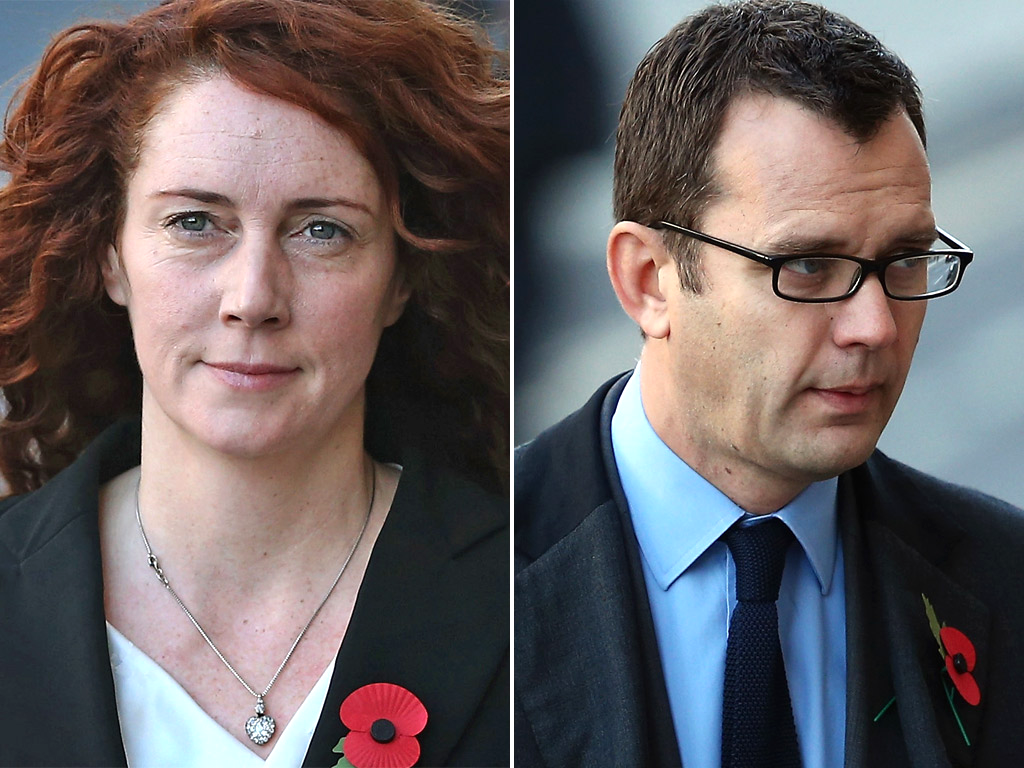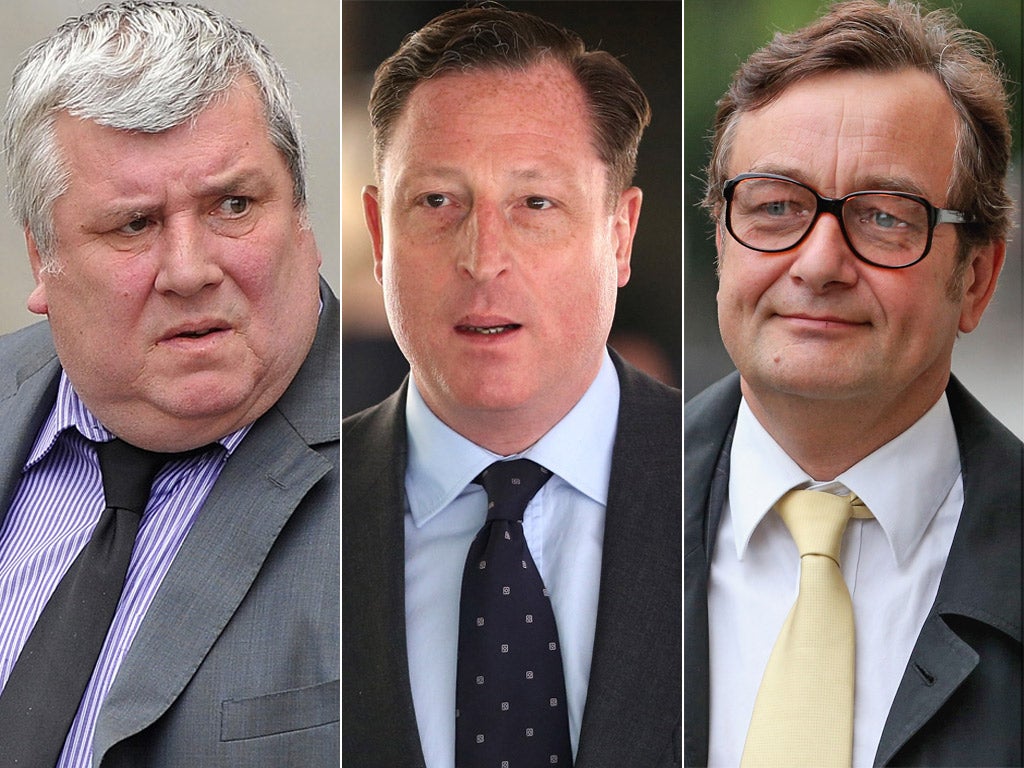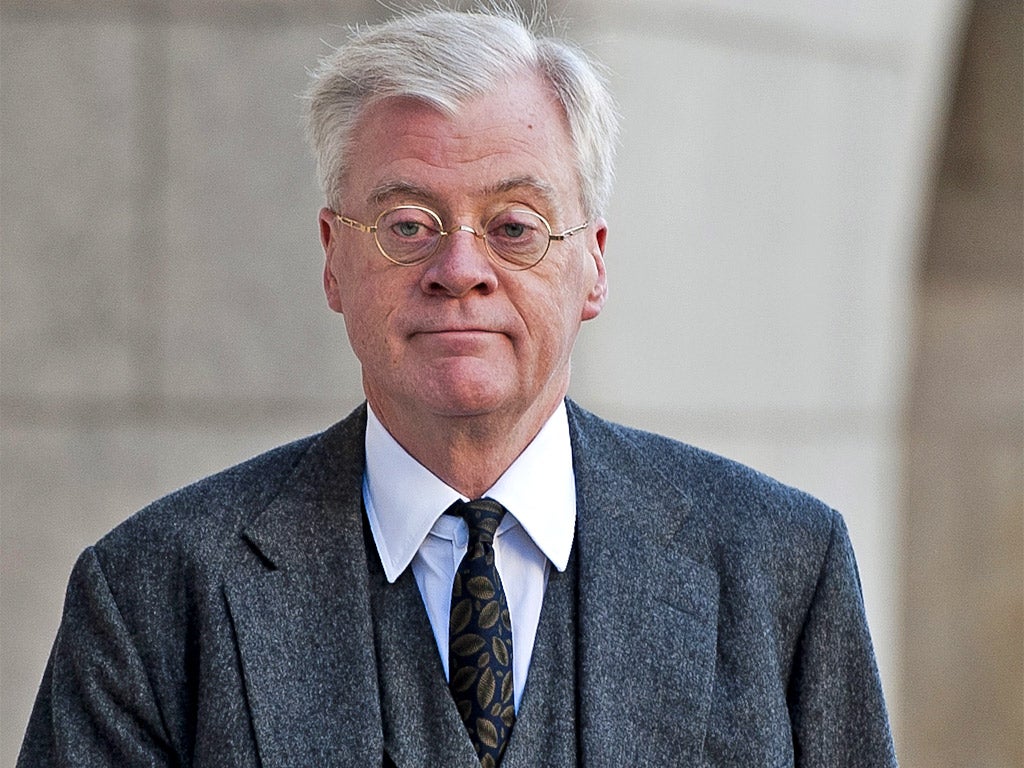Phone hacking trial: Missing notebooks and illegal payments - the case against Rebekah Brooks
Startling allegations as phone-hacking prosecutor insists that ‘News of the World’ editors must have known about conspiracy to ‘intrude into people’s privacy’ illegally

Prosecutors have set out the case against Rebekah Brooks and Andy Coulson at the Old Bailey, telling jurors that “the people in charge of the purse strings” at the News of the World knew that phone hacking was being carried out on their watch.
On the second day of a trial that could last for six months, the court was told that three former NOTW journalists who were in charge of news operations at the Murdoch-owned Sunday tabloid had pleaded guilty to phone-hacking charges. The prosecution also said that Glenn Mulcaire, the hacking specialist regularly commissioned by the newspaper, had pleaded guilty to hacking the phone of the murdered schoolgirl Milly Dowler in 2002.
In his opening address, the prosecutor Andrew Edis, QC, said that the guilty pleas from former newsdesk editors Neville Thurlbeck, James Weatherup and Greg Miskiw had been made at an earlier stage of legal proceedings. Mulcaire, who had been already been convicted of phone-hacking charges in 2007, the jury was told, was described to the court as the man hired by the now-closed Sunday paper because he was good at finding the codes that provided access to private voicemail messages.
All four pleaded guilty to a charge of conspiracy to illegally intercept communications in the course of their transmission. The jury heard that previous admissions by News International had focused on a rogue reporter, namely the paper’s former royal correspondent, Clive Goodman, who was jailed in 2007 along with Mulcaire.
Mr Edis said the earlier investigation by the Metropolitan Police had been “quite restricted”, but suggested the phone-hacking inquiry reopened two years ago had revealed “a lot more”. The jury heard that because Scotland Yard’s Operation Weeting investigation had now secured the convictions of the three news editors and Mulcaire, “it cannot... ever [be] suggested by anybody that phone-hacking at the NOTW was restricted to Mr Clive Goodman”. Mr Edis said the guilty pleas of the news editors “prove that there was a conspiracy” at the paper.
Phone hacking is one of three alleged conspiracies involving eight defendants that the jury will be asked to consider over the coming months.
All eight sat together in the dock, separated from the court by a glass panel, as Mr Edis laid out the Crown’s case. The charges, which do not apply uniformly to all the accused, involve hacking, conspiracy to pervert the course of justice by “secretly preventing” information from being obtained by police, and the allegation that officials holding public office had been persuaded to sell secret and private information to the NOTW and Sun newspapers. The jury was told that payments to one MoD official approved by Ms Brooks totalled £40,000.
“This is a crime,” Mr Edis said, adding that while the criminal law demanded high standards from public officials, he wanted the jury to know they were “not dealing with whistleblowers”.
Promising “a long trial” that would focus on events that had made “big news”, Mr Edis told the jury that “journalism was not on trial”. But he added that there had been no justification for journalists at the NOTW to resort to hacking and blagging, saying the activities were an “intrusion into people’s privacy, which is against the law” and “journalists are no more entitled to break the law than anyone else”.
Ms Brooks, the former chief executive of News International, and Mr Coulson, David Cameron’s former director of communications, who was initially Mrs Brooks’ deputy editor at the NOTW before moving into the editor’s chair himself, sat silently with their co-defendants as Mr Edis told the jury that those responsible for running the NOTW had allowed phone hacking to happen, had been responsible for the payments to Mulcaire and had been part of the conspiracy which allowed it to continue at the paper.
He said that the practice of phone hacking inside the newspaper was “pervasive”.
Addressing the nine men and three women on the jury, he told them that among their tasks was to decide: “If there was phone hacking – who knew?” Mr Edis said they needed to consider whether Mrs Brooks and Mr Coulson, the editors of the NOTW from 2000 to 2006 when phone-hacking took place, must have known how stories on their papers were being obtained.
“The News of the World is a Sunday paper,” Mr Edis told the court. “That means it published once a week, 52 times a year. It wasn’t War And Peace. It wasn’t an enormous document. It was the sort of document that if you were its editor you could actually take an interest in its content without too much trouble.
“What you are going to have to decide is whether [those running the paper] were doing their jobs properly. [If they were] we say they must have known where some of these stories came from, otherwise they would never have got in the paper. They must have known.”
Mrs Brooks and Mr Coulson, along with the NOTW’s former managing editor Stuart Kuttner and the paper’s former news editor Ian Edmondson, are charged with conspiracy to intercept phone messages.
The prosecution told the court that Mr Edmondson had personally intercepted calls after Mulcaire’s techniques were learnt by key journalists on the newsdesk.
Mr Edis told the jury: “There came a time when Mr Edmondson was doing his own do-it-yourself hacking as well.” He said that Mr Edmondson’s targets included Sebastian Hamilton and Dennis Rice, two journalists who worked at the Mail on Sunday.
The jurors were told that the case was so notorious that they would all know some of the details “because everyone does”.
“The investigation and discoveries [by Scotland Yard] resulted as you know in the closure of the News of the World and if you remember that came about because of the discovery that the telephone of a young murdered girl Milly Dowler had been hacked by somebody acting on behalf of [the paper],” said Mr Edis. “Those events were very big news at the time – and some events have been big news since.” But he warned jurors to “put out of your minds what you already know”, adding: “You will have quite enough information here”. The case against the defendants, he promised, was straightforward. Mr Edis went out of his way to stress that the case should not be seen as an attempt to restrain the activities of the wider newspaper industry.
“This prosecution is not an attack on the freedom of the press or the practice of journalism or anything like that,” he said. “The prosecution accepts that it’s important in a free country that there’s a free press.”

The jury was told that Goodman is charged at this trial with conspiring with Coulson to commit misconduct in public office by paying a police officer attached to the Royal household for private telephone numbers.
“They agreed that the News of the World would pay a palace [Buckingham Palace] police officer a sum of money in return for a Royal telephone directory which contained telephone numbers of members of the Royal household,” said Mr Edis, who told the court that the agreement between the two journalists was set out in email correspondence. He said that 15 Royal phone directories were later seized during a police raid on Goodman’s house.
Ms Brooks is also charged with conspiracy to pervert the course of justice along with her husband Charlie, and other co-defendants Cheryl Carter, Mrs Brooks’ former personal assistant, and Mark Hanna, a former head of security at News International.
Mr Edis said that the offence was committed after reports that the News of the World had hacked Milly Dowler’s phone in 2011. “There was a great storm of publicity and it was quite obvious to anyone, the prosecution say, that this wasn’t going to go away; the police were going to find out how much phone-hacking there had been and there was going to be a serious investigation,” said Mr Edis.
“We say that Rebekah Brooks and her personal assistant Cheryl Carter agreed that Cheryl Carter would get from the archive at News International Rebekah Brooks’ journalistic notebooks.”
The notebooks, he said, were removed on the Friday before the last edition of the NOTW was published in July 2011, and have not been found. “They would reveal material about how she operated, wouldn’t they?” Mr Edis said. “We will never know what they contained because they have gone.”

He also referred to the removal of material from the Brooks family homes in Oxfordshire and London. “Quite a complicated little operation was set up in order to prevent the police finding all the computers, all the phones, all the iPads, all the documents that they would have wanted to consider,” he told the jury. Mrs Brooks, Mr Coulson and the six other accused deny all the charges against them.
The case is expected to continue until Easter next year.
Dramatis personae: The legal rivals
The Judge: Mr Justice Saunders
Otherwise known as Sir John Henry Boulton Saunders, he is best known for being the man who sent the expenses cheat MPs to prison, after which the London Evening Standard said: “That self-assured approach in the media spotlight means he is being increasingly trusted for major criminal cases.”
Called to the Bar in 1972 and appointed Queen’s Counsel in 1991, he has presided over numerous high-profile cases. Last year, he sentenced a senior Metropolitan Police officer, Commander Ali Dizaei, to three years in jail for misconduct in public office and perverting the course of justice.
Mr Justice Saunders has also previously jailed two corrupt Nottinghamshire Police officers who passed data to criminals.
And he presided over the trials of Lord Taylor, Lord Hanningfield and Jim Devine following the Westminster expenses scandal. He also sentenced other politicians – including former Environment minister Elliot Morley – who had already pleaded guilty to making fraudulent claims.
At one of the expenses trials, Mr Justice Saunders ordered Lord Alan Sugar to delete a tweet that he thought could prejudice proceedings. The judge cleared the court and said: “Can someone contact Lord Sugar and get that removed.” The tweet was taken down 20 minutes later.
Leading for the Prosecution: Andrew Edis QC
Named as “Crime Silk of the Year” for 2013, Mr Edis’s CV of famous cases rivals that of Miss Marple with highlights including “The Beauty in the Bath”, “Death on the Nile” and “The Lady in the Lake”. He has become known for prosecuting major terrorism cases. He acted for the Crown in the successful prosecution of the former Energy Secretary Chris Huhne and his ex-wife, Vicky Pryce, in the speeding points case. One of his early successes was in defending the former footballer Bruce Grobbelaar after he was accused of match-fixing by The Sun, sister paper of the News of the World.
Leading for Rebekah Brooks: Jonathan Laidlaw QC
Like his courtroom opponent, Andrew Edis, Mr Laidlaw is based at 2 Hare Court chambers. He represented the Football Association at the Hillsborough inquest, while as a Treasury counsel he has had experience in prosecuting high-profile criminal cases, including the bombing of Canary Wharf by the Provisional IRA, the murder of the TV presenter Jill Dando, the al-Qa’ida attack on Glasgow airport and the Official Secrets Act trials of Richard Tomlinson and David Shayler. He recently represented the Metropolitan Police Commissioner in the case of the arrest of David Miranda, partner of The Guardian’s journalist Glenn Greenwald who was questioned under terrorism laws at Heathrow.
Leading for Andy Coulson: Timothy Langdale QC
On its website, Langdale’s Cloth Fair Chambers uses a pugilistic metaphor to describe his legal style. “The courtroom is his natural habitat,” it says. “Like a champion boxer who has marked out every inch of the ring, he knows exactly where he is and precisely how to manoeuvre his opponent.” He prosecuted in the case of Sarah Payne’s killer, Roy Whiting, but most of his highest-profile work has been in defence.
He represented the “Suffolk Strangler”, Steve Wright. Last year, he defended Gousul Islam, a doctor jailed for sex crimes, and Rajendra Kokkarne, another doctor, acquitted of causing death by overdoses of morphine. He also represented the News of the World in a libel action brought by jockey Kieren Fallon, who was accused of race-fixing following an undercover sting. (Fallon was subsequently cleared).
